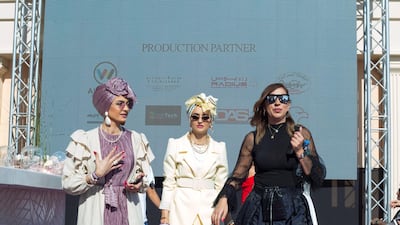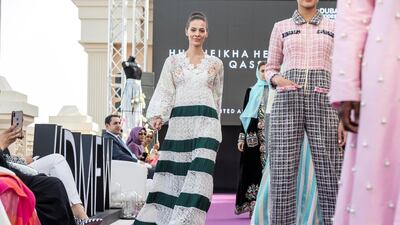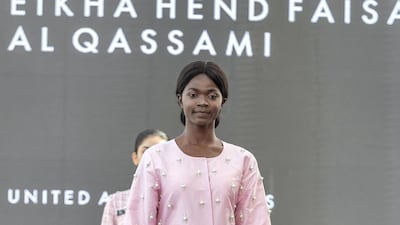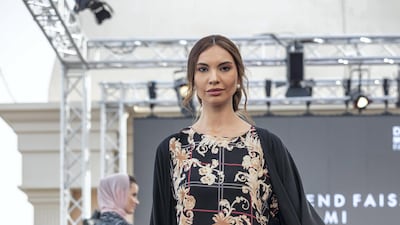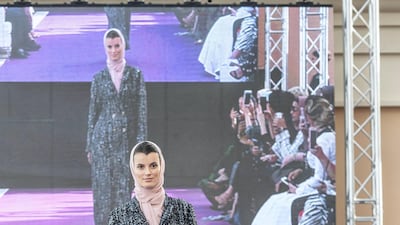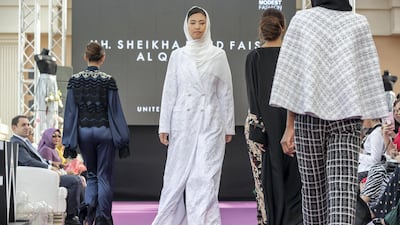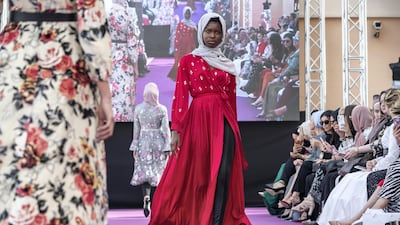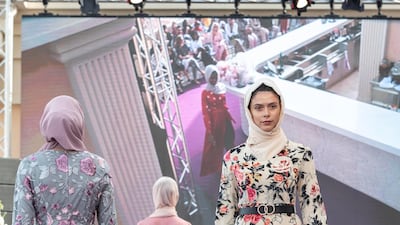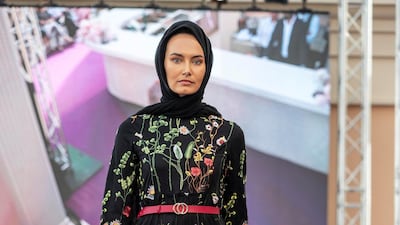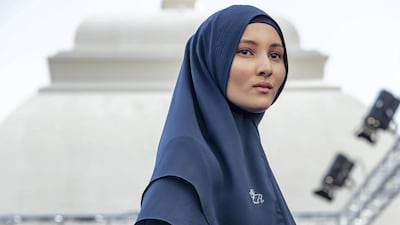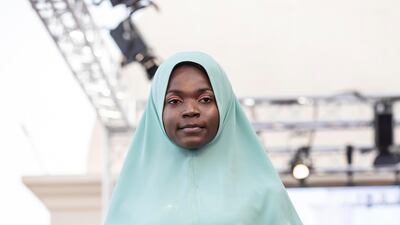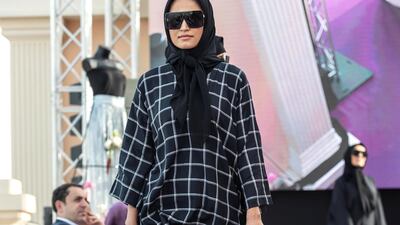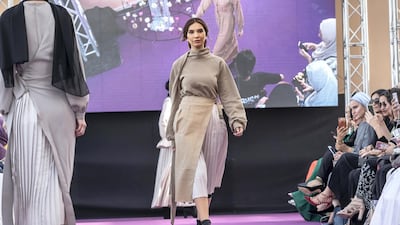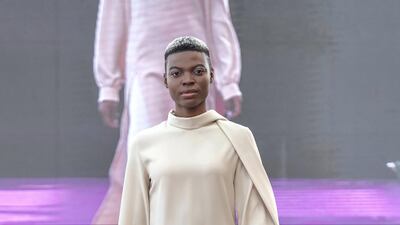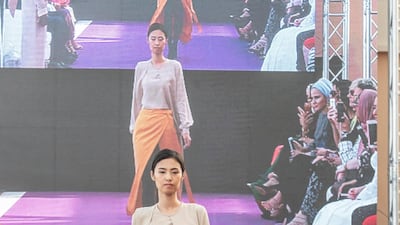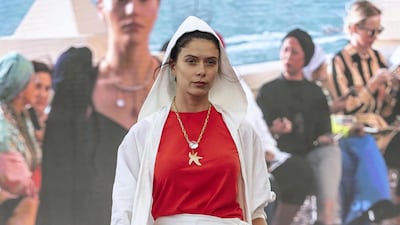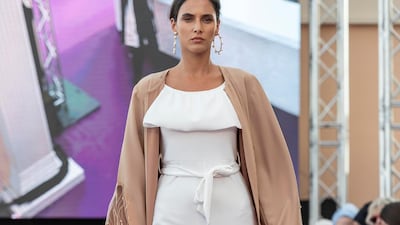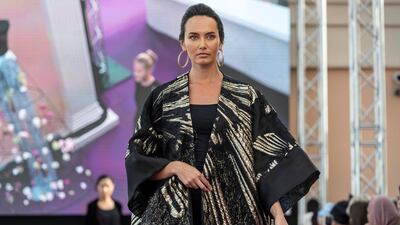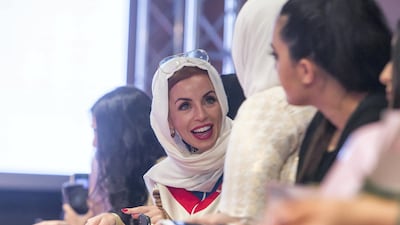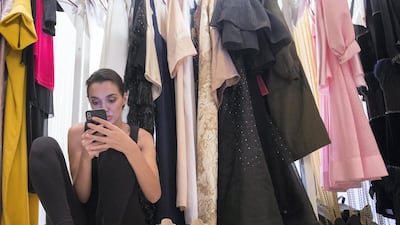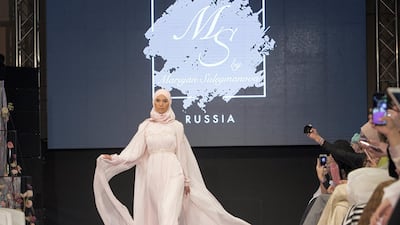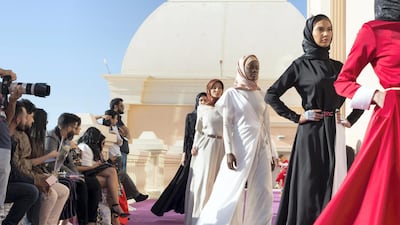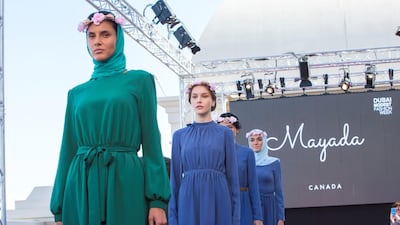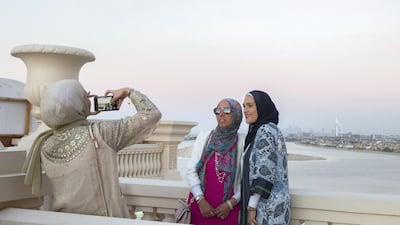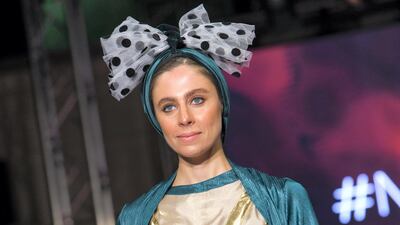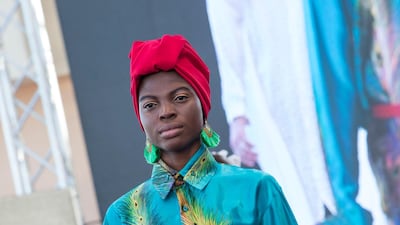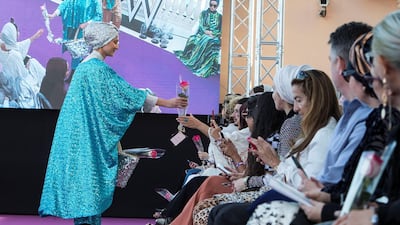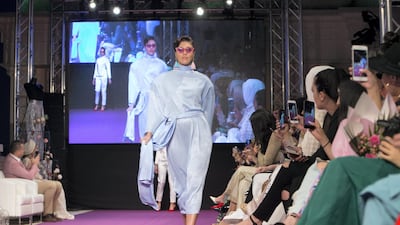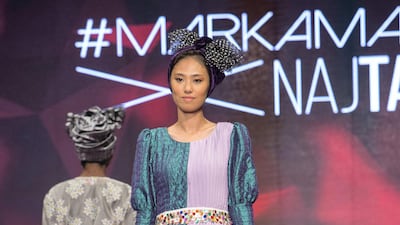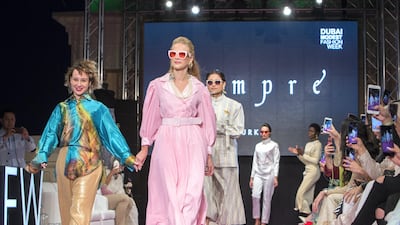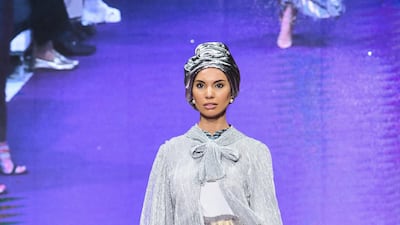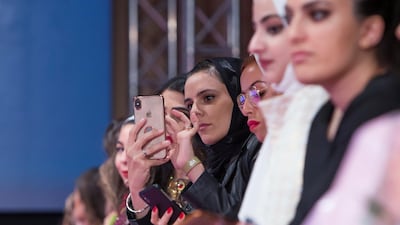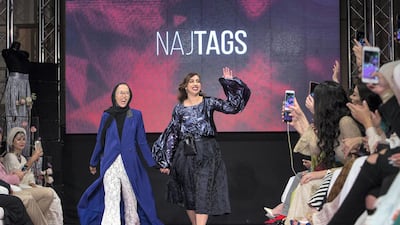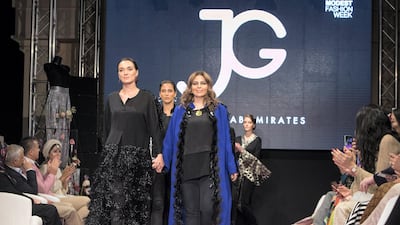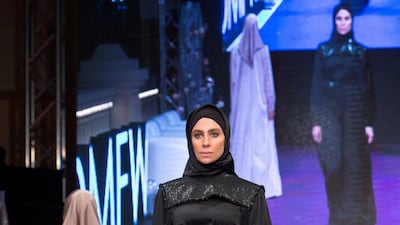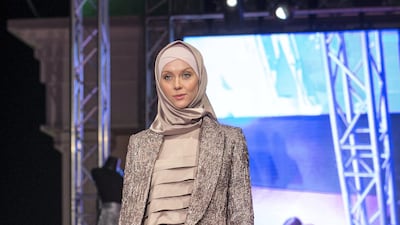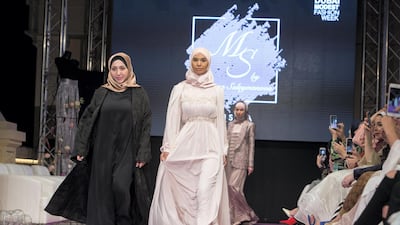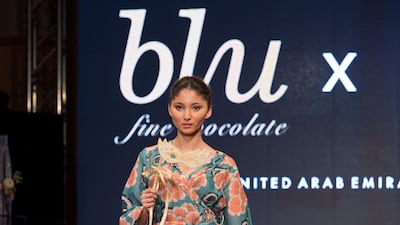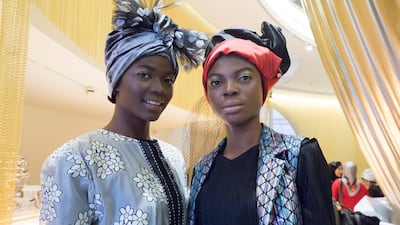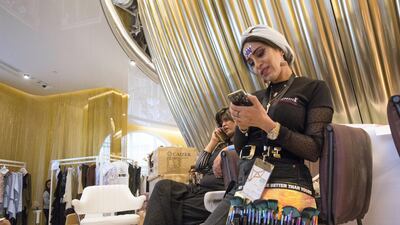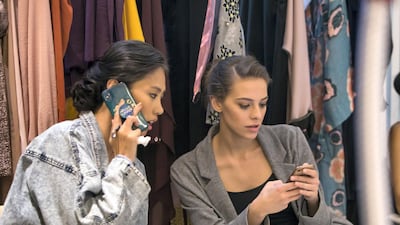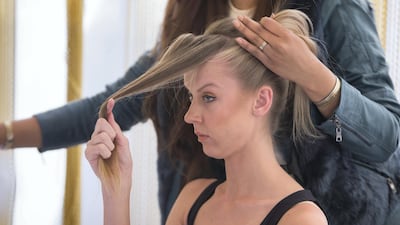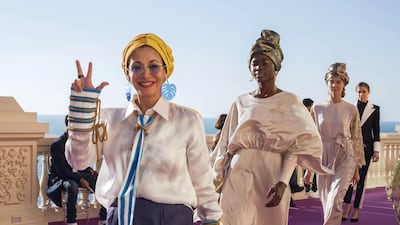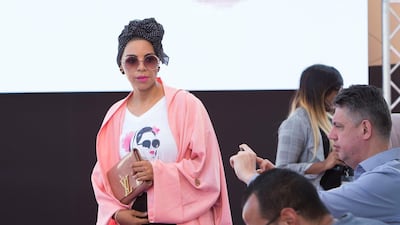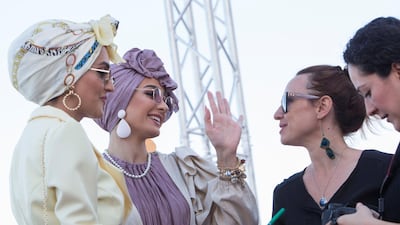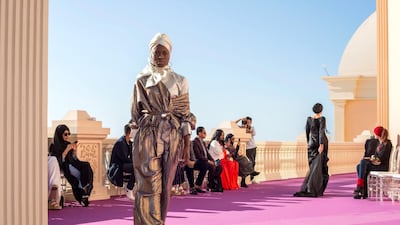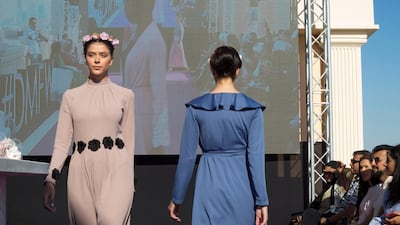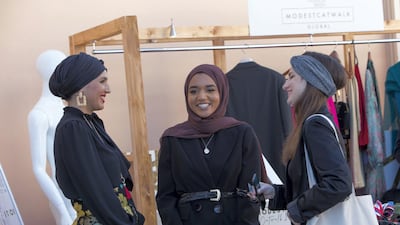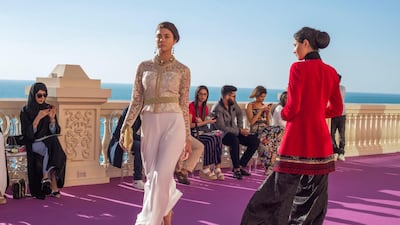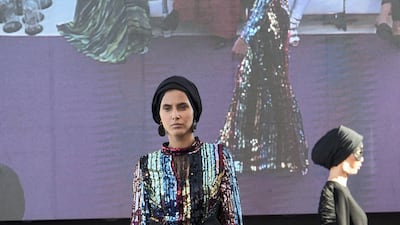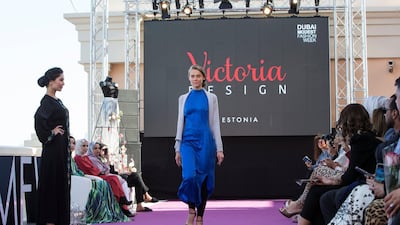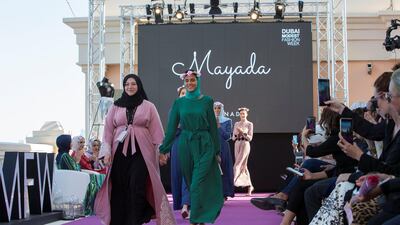A cluster of women, strikingly dressed, pose for photographs on the waterfront rooftop terrace of the Emerald Palace Kempinski hotel on the Palm Jumeirah. Sporting garments with bold prints and in exaggerated silhouettes, most of them are covered from neck to ankle, and many wear variations of the hijab. Almost all of them brandish purple wristbands emblazoned with the word "Influencer", granting them access to the coveted front row of the Dubai Modest Fashion Week runway.
The opulent venue and style-savvy guests contribute to a glamorous weekend, complete with the selfie sticks, designer logos and layers of false lashes typical of any fashion event. Guests' outfits – or street-style, as it's colloquially called – are as eye-catching as some of the runway ensembles. A neon green jumper with a cape of iridescent sequins; a floor-length red trench coat in patent leather; and a leopard-print jumpsuit with a matching turban and gemstone-emblazoned belt are some of the outlandish outfits on-site. Some visitors even wear oversized paparazzi sunglasses long after the sun has set.
Focusing on sustainable business relationships
The event brings together the who's who of the global modest-fashion blogging world, plus a jam-packed programme of runway shows, talks and workshops. Modest Fashion Week first took place in Dubai in 2017 with plenty of fanfare; it was set in Burj Park, and featured famous industry faces such as hijabi model Halima Aden and vlogger Dina Torkia. Last weekend, however, the platform's self-funded co-founders, Franka Soeria and Ozlem Sahin, took a more altruistic approach, highlighting "fashion for good", as well as celebrating female entrepreneurship to mark International Women's Day.
While more than 60 influencers are featured as "special guests", Sahin emphasises that the key aim of DMFW is now not so much to recruit fashion bloggers to hype up the event, but rather to support participating designers and promote collaborations between creatives. "We are looking for sustainable business relationships for the industry," she says. Accordingly, Instagram handles are exchanged as modest fashion fans from across the globe watch the shows, participate in panel discussions and browse the retail booths of various modestwear brands.
Dubai designer Safiya Abdallah, who presented a runway show and moderated a talk, says networking is critical in the modest-fashion sphere. "Building relationships, getting into stores and boutiques, knowing stylists, getting into magazines – those all come through networking," she says.
Creating brand awareness
The event includes a meet-and-greet session with well-known modest-fashion bloggers, many of whom are dressed by the participating designers, giving their labels further exposure – a marketing move that's invaluable to brands, according to Abdallah, who is the founder of Dulce by Safiya. "It may not be that you get a hundred sales that day, but collaborating with influencers creates brand awareness," she says.
Day one of Dubai Modest Fashion Week:
Although participating in the big fashion weeks of New York, Paris, London and Milan are every aspiring designer's dream, Abdallah explains that Modest Fashion Weeks, which also take place in Jakarta, Istanbul and London, are far more beneficial for modestwear designers. "The people who come to these are specifically looking for modest brands, whereas if you do go to New York Fashion Week or Milan Fashion Week, you have a mixed audience," she says. "Here, you get a tailored audience, whether they're Muslim or not Muslim." Case in point: 21-year-old Alexa Dudley, an Apostolic Christian pre-med student and modest-fashion blogger from Tennessee, is a front-row regular at DMFW this year after flying from the United States especially for this event.
The weekend has a diverse blend of names, accents and variations of modest fashion – a mix that is reflected on the runways, which showcase the work of more than 40 designers from 25 countries. A handful of seemingly ordinary abayas and humdrum dresses underwhelm the catwalk now and again, but there are plenty of show-stopping looks to compensate. From Iranian label Sweet Dolcee's romantic organza cover-ups with bubblegum-coloured embellishments, to Russian brand Ahada's theatrical jewel-toned capes decorated with chunky gold belts, DMFW covers a range of styles on the modestwear spectrum. Many collections take cultural cues, such as Adrianna Yariqa's abaya-inspired garments, crafted in traditional Singaporean silhouettes.
A spirit of warmth, creativity and inclusivity
One of the most touching moments is the showcase by Asiya Rafiq, an Abu Dhabi designer who creates modest fashion for women with disabilities. After volunteering to work with people of determination at the UAE Special Olympics, Rafiq was inspired to create clothing that caters for people with intellectual disabilities. Her practical, easy-to-wear garments feature zippers and Velcro for women who require wheelchairs, and magnetic buttons for those with Parkinson's disease.
"Often when we think of inclusivity, we think of plus-sized models," says Sabrina Salhi, founder of ladies' night Unveiled, and one of the talk-show moderators at DMFW.
Day two of Dubai Modest Fashion Week:
But this year's event touches on themes far deeper than fashion. Salhi leads a panel discussion highlighting Rafiq's plight to create clothes for the disabled community, as well as Indonesian brand Markamarie's collaboration with the United Nations High Commissioner for Refugees, which empowers refugees living in the country to help produce its clothing. "Fashion is very prestigious and luxurious, and now we have the attention on modest fashion," says Soeria. "Do we want to take it further into the glamorous, consumerism side? Or try to drive people to do something good?"
Cultivating a spirit of warmth, creativity and inclusivity, adds Soeira, is more important than promoting the platform as some sort of social or religious authority on modest fashion. "We don't talk about religion at all," she says. "Ozlem and I are the perfect representation of modest fashion; she doesn't wear a hijab, I wear a hijab; she's European, I'm Asian."
Fashion weeks are typically exclusive and cater to the elite echelons of society. While modesty has skyrocketed in the mainstream thanks to a handful of international luxury designers recognising the popularity of clothing that's at once chic and conservative, Dubai Modest Fashion Week aims to highlight personal ideals of modesty. As Salhi puts it: "Modest fashion stems from a spiritual place."
It’s a refreshing direction for Soeria and Sahin, who are balancing out the stereotypical glitz and glamour often required of fashion events, through initiatives that encourage humanitarian efforts, support underprivileged communities and promote the longevity of the modest-fashion industry.
"We don't want this to be viral and after that dead; we want it to be sustainable," Soeria says. "Modest fashion is no longer all about the bling-bling and the glamour – that's old. Do good, that's the new trend."
Three brands to watch
Imen Bousnina, Austria
Accordion pleats, asymmetrical lines and utilitarian touches appear on a palette of neutral, sand tones in Austrian label Imen Bousnina’s spring/ summer 2019 collection. Garments such as a long hooded dress, wrap-skirt with peekaboo pleats and a camelcoloured jacket with long front panels instantly combat the stereotype that modest fashion must be matronly. There are surprise pops of gold and tangerine tones that appear on both trousers and tailored jackets. These are contemporary urban staples, and they for make statement pieces in the wardrobes of women who are seeking to fuse western styles with modest silhouettes.
Johar, Jordan
While many brands tend to play it safe with modest wear, Jordanian designer Dalia Al Jamal experiments with textiles, draping and styling. The models who walk the runway at Dubai Modest Fashion Week dressed in Al Jamal’s brand, Johar, exude striking rock ‘n’ roll glamour, with each one showcasing a different take on the designer’s vision of modest evening wear, completed with simple turban headwraps and dramatic drop earrings. Favourites from the collection include a head-totoe silver set with an added trail; an edgy white ensemble with a fringing effect down the arms and shoulders; and a puffy metallic parka that Al Jamal pairs with matching athletic joggers.
Dulce by Safiya, Dubai
At once bold and bohemian, Dulce by Safiya’s designs are versatile and easy to wear. With features such as paper-bag waists, cowl necks, slouchy sleeves and a focus on ruching, the pieces from the Dubai brand’s Nostalgia collection combine a street aesthetic with the elegance so often sought out by Middle Eastern women. Designer Safiya Abdallah’s variation of the power suit is a pair of taupe-toned palazzo pants with a high-necked smocked blouse. A sparkling gold dress with kimono sleeves is an evening ensemble that’s sure to turn heads, and Japanese influences are also visible in a two-piece organza kimono set printed with teal and coral flowers.
